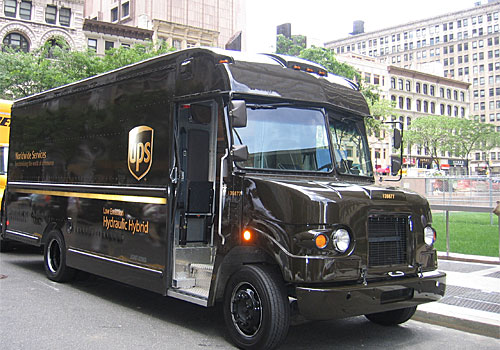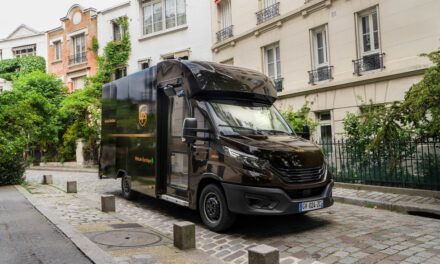
UPS deploys 40 vehicles generating power through braking
UPS is taking advantage of the frequent stopping of its courier trucks as they’re dropping off packages, to actually generate energy to drive the vehicles. The US integrator has been working with manufacturer partners Freightliner Custom Chassis and Parker Hannifin Corporation since 2006 to develop the technology, called hydraulic hybrid vehicles (HHVs).
The vehicles use a combination of diesel engines and electric motors for power, but the batteries for the electric motors can be topped up by energy recovered when drivers apply the brakes.
Drivers can turn off the diesel engine to power the vehicle purely using the energy stored from its braking activity, which UPS said can reduce engine operating times by up to 90 minutes on a typical route.
The technology offers a 35% better fuel economy than conventional diesel trucks according to UPS, along with a 30% cut in carbon emissions, although US government testing suggests the technology offers a 13-20% better fuel economy.
The company said yesterday it is now to deploy 40 of the vehicles in two US cities by the end of this year.
Mike Britt, UPS director of alternative fuel vehicle engineering, said the project was part of the integrator’s long-term efforts to minimise dependence on fossil fuels.
“As early adopters of this technology, we are very pleased with the significant fuel economy and emission reductions that come from the HHVs,” said Britt.
After testing the HHV technology in the Laguna Hills area of California, UPS will now be introducing 20 of the vehicles to the city of Baltimore and 20 to its home base of Atlanta.
UPS said because of the requirement for constant braking to maximise the benefits of the HHV technology, the vehicles are most suited for urban routes, which typically involve frequent stopping and starting.
Hybrid evaluation

Testing by the US government found the UPS HHV vehicle achieved a 13-20% better fuel economy
The HHV project is being supported by the US Department of Energy’s Clean Cities programme, which has just issued a new research study with the results of an 18-month evaluation of diesel-hybrid technology in UPS vans.
The study said the UPS diesel-hybrids tested over three different routes achieved a 13 to 20% better fuel economy than conventional vans, with up to a 45% improvement in ton-miles-per-gallon.
The US Department of Energy’s National Renewable Energy Laboratory evaluated 11 hybrid and 11 conventional step vans operated by UPS in Minneapolis, along with lab tests in Denver.
The vehicles tested did include the regenerative braking technology.
Although there was a clear benefit in fuel consumption, the NREL testing did find that the hybrid technology had an impact on vehicle reliability. However, the researchers said one reason for this was the prototype nature of the vehicles being tested.
NREL project engineer Michael Lammert said: “The reliability of the hybrids was slightly lower, 92.5%, compared to 99.7%, in part due to troubleshooting and recalibration issues related to prototype components. Differences in per-mile maintenance and operating costs were not statistically significant.”
UPS now operates 2,593 vehicles using alternative drive technology, including hybrid electric, all-electric, liquified natural gas, bio-methane and propane-powered vehicles. The company says up to 2011, its alternative fleet had logged more than 240m miles, “well on track” to reaching the company’s goal of 400m miles by 2017.












